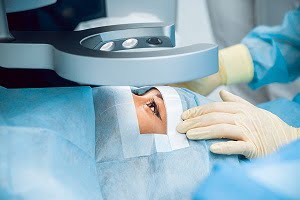How Is Your Cataract Treated?
- Updated on: Jul 15, 2024
- 3 min Read
- Published on Oct 3, 2019

Cataract Treatment
The treatment of cataract is mostly done through surgery. But in some cases glasses or contact lenses are also used to solve the problem temporarily.
When you begin to experience symptoms of cataract, you should go for an eye examination. An ophthalmologist can confirm, after an eye checkup, if your cataract is mild and your vision can be improved for some period of time using glasses and contact lenses. It is generally advisable not to undergo cataract surgery in such cases.
When should you undergo a cataract surgery?
One should undergo the cataract surgery after consulting with the doctor and knowing that the surgery is the only solution.
Cataract surgery is done mostly in cases where cataract and cloudy vision affects our day to day activities and makes it hard to do even simple work tasks like playing and other daily chores.
Cataract is a disease in which the natural lenses of your eyes get cloudy due to clumping of protein on the lenses inside the eye. In a cataract surgery, the natural lenses of the eyes are replaced by artificial lenses through operational implantation. These lenses are called intraocular lenses.
What are the procedures of a cataract surgery?
Cataract surgery consists of three procedures:
- Pre-surgical
- Surgical
- Post-surgical.
What Happens Before A Cataract Surgery?
Before one or two week of the surgery, your doctor examines the eye and perform certain tests to measure the shape of your eye and curvature of cornea so as to choose the right intraocular lenses for you.
You may be asked not to eat and drink 12 hours before the surgery.
What Happens During A Cataract Surgery?
Following things happen during a cataract surgery:
- Your natural cloudy lenses are removed from the eye and artificial lenses called intraocular lenses are placed into the eyes which then become permanent parts of your eyes and work as natural lenses.
- In some people other eye problems prohibit use of intraocular lenses. In such cases, after removing the cataract, glasses or contact lenses are provided to correct the vision.
- Cataract surgery is an outpatient method. You can go home right after surgery. You don’t need to stay in the hospital.
- Anesthesia is used for this surgery but only to numb the required portion of your eye. Patient stays awake during the surgical procedure.
- The success rate of surgery is 95% and mostly people do not face any post-surgical complications. But surgery carries risk of eye infection, and bleeding. Also, the risk of retinal detachment increases.
What Happens After Surgery Of Cataract?
After the surgery, itching, mild discomfort and fluid discharge from eye are normal. Eye may become sensitive to light and touch. Your doctor will guide about the treatment for these problems. After 1 to 2 days, this mild to moderate discomfort should disappear.
Complete healing generally occurs in 8 weeks. You are asked to use eye drops prescribed by your doctor for a few weeks after the surgery. These eye drops help in healing fast and also avoid infections.
Your doctor will also tell how to use these drops, how often to put them, and about their possible side effects.
Mostly, post-surgical issues go after one to two week of surgery but if these persist, you should meet your doctor to know the exact cause. If the cataract surgery is needed in both the eyes, your doctor will generally operate one eye and only after it heals, the other eye will be operated.
Post-surgery preventive measures
Although vision is recovered after surgery immediately, the following prevention and care should be taken by the patient:
- Wear sunglasses and eye glasses to protect your eye
- Do not go into sunlight
- Protect eyes from UV rays
- Avoid entry of soap and water inside the eye
- Don’t do household chores and lift things. Even bending too much to pick up things is not allowed.
- Don’t rub or press eyes
- Use eye drops regularly
After 8 weeks from the surgery, when the eyes heal, your doctor will examine them again. He or she will provide you with glasses to correct any vision problem thereafter.
What are the post-surgical risks and complications?
Cataract surgery success rate is high. People do not generally face severe complications after the surgery. But in some cases, complications may occur which are as follows:
- Eye infection
- Bleeding in eyes
- Retinal swelling
- Fluid discharge from eye
- Swelling in front and inside the eye which worsens
- Other part of eye may be damaged
- Pain that do not go even with counter medicines
- Increased risk of retinal detachment
- Vision loss
- Dislocation of artificial lens
The above listed complications are very rare.












